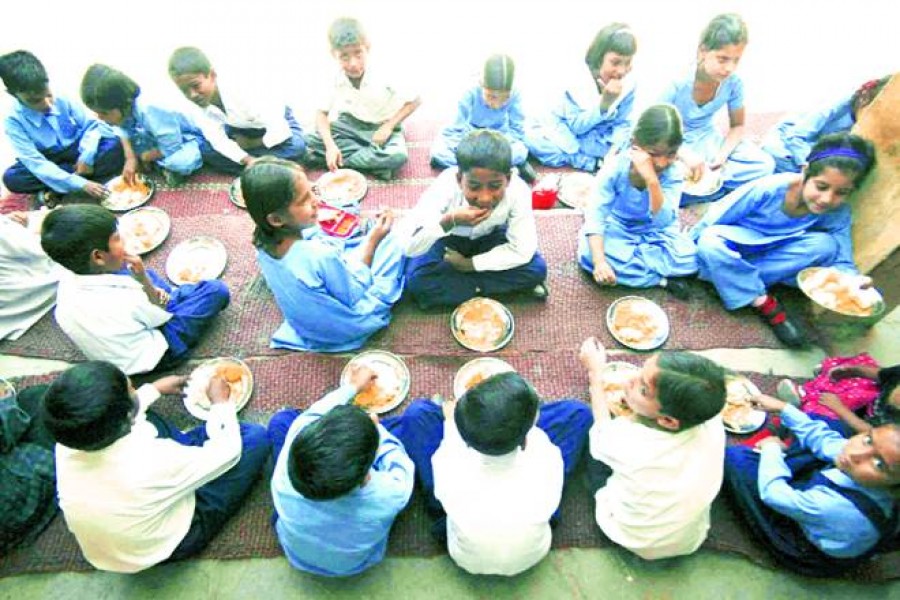
Published :
Updated :

The Cabinet's approval of the draft policy on national school mid-day meal on August 19 is indeed a significant step. Over the last one decade, arranging lunch and snacks for rural government primary school students randomly has borne a series of fruits. Especially in the remote poverty-stricken areas, primary-level students' attendance has increased by 11 per cent at schools where cooked foods are served. The attendance has registered a rise by 6.0 per cent where biscuits are distributed at classes. This is not a radically novel idea; as an extra bit of incentive for keeping child students enrolled in schools has long been in practice among countries in the least developed regions. They include the Sub-Saharan Africa and South Asia. Yet, Bangladesh stands out among them with its successful implementation of the school feeding programme. That the country occupied a distinctive place in the achievement of primary education enrolment as per the Millennium Development Goals (MDGs) had a lot to do with the incentives offered in the form of food.
It's no exaggeration to say that Bangladesh could realise the future potential of keeping children at the school with the help of school feeding programmes. The draft of the National School Meal Policy 2019 has received the Cabinet's nod. In accordance with the approval of the draft policy, students of all government primary schools are now set to be brought under the universal mid-day meal coverage by 2023. As a rural area-based project, it is no doubt a massive one requiring skilled manpower having expertise in feeding thousands of kids with lunchtime meal. Teachers alone cannot be expected to implement the programme. Their necessity is felt when it comes to enforcement of discipline during food distribution.
The multi-faceted nature of the primary school students feeding programme notwithstanding, it has assumed the proportions of an imperative for these schools; and their vulnerable students. With the dropout rates soaring unabated, owing mainly to the parents' need for the boys and girls to help them in adult work, the school feeding could prove a force in drawing students to disciplined learning. In fact, since the feeding programme is aimed at bringing all the students of government primary schools under the mid-day meal by 2023, an estimated Tk 28.35 billion a year is set to be required --- with the food comprising high-calorie biscuits to be provided. With cooked food five days a week, the sum comes to Tk 55.60 billion. Since the multi-layered programme involves purchase and proper distribution of food items, the need for strong supervisory bodies cannot by bypassed. One wishes the programme is put in place without the spectres of irregularities that might haunt it.
For Bangladesh, a country with passable functional literacy, the primary-level classes play a critical role in its overall education scenario. These classes offer the base on which the future nation builders set their feet firmly in order to reach the broader frontiers of life. Moreover, once they pass out of the primary schools, many students cannot resist the urge to get admitted to higher classes. No matter what the means is --- through mid-day meal or extra-curricular attractions -- the child learners ought to be retained at school with the inducements. In a socio-economically backward society, there are few options.


 For all latest news, follow The Financial Express Google News channel.
For all latest news, follow The Financial Express Google News channel.